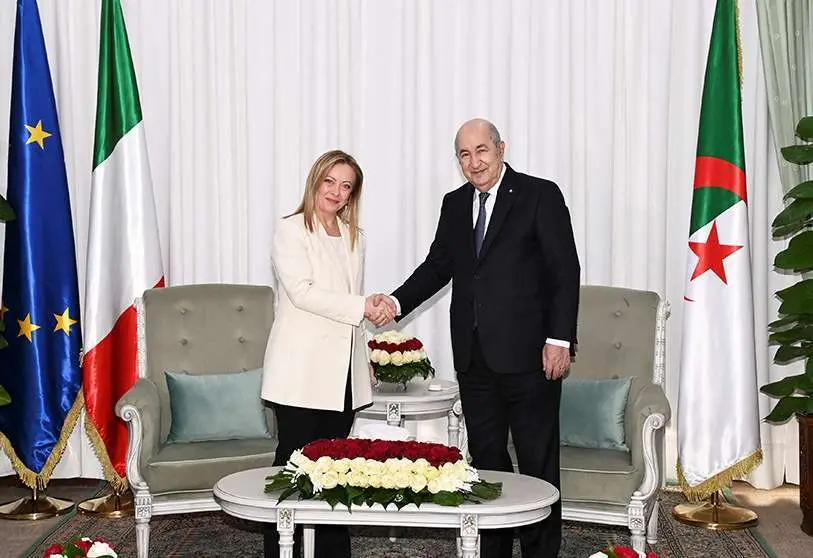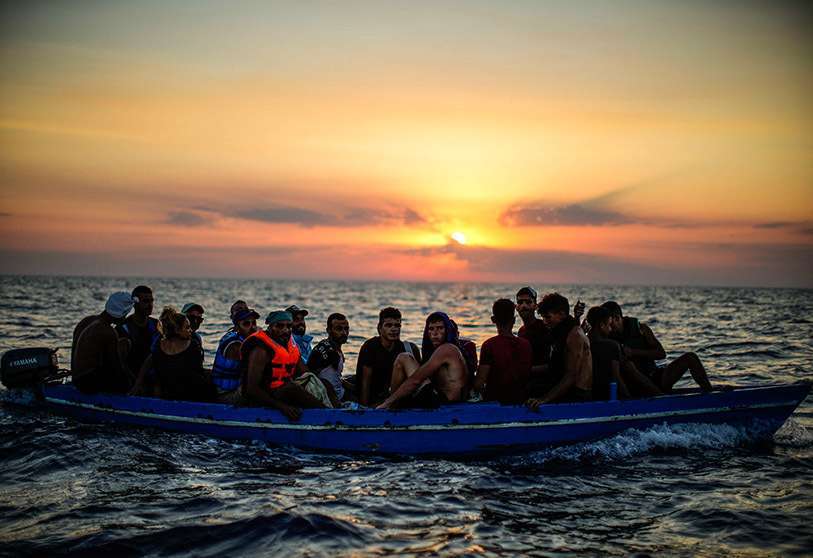Meloni resumes Draghi's agenda in Algeria: "We will be a gas hub for Europe"

Giorgia Meloni has taken up Mario Draghi's agenda in Algeria with force. The former Italian Prime Minister bequeathed to his successor a battery of energy agreements with the Maghreb country, aimed at reducing its dependence on Russian gas and turning Italy into a logistical energy hub for Europe. The first woman to preside over the Council of Ministers, who took office in October amid criticism for her militancy in post-fascist movements and eurosceptic positions, wants to go a step further and redouble Draghi's commitment to the region by focusing on issues such as immigration, the economy and the resolution of geopolitical conflicts.
Meloni chose Algeria for her first official visit to Africa, aware of the importance of their bilateral relations. It was also the first official visit in 2023. "It is not by chance," she said later at a joint press conference with Algerian President Abdelmadjid Tebboune. The Italian Prime Minister had landed on Sunday at Algiers' Houari Boumedienne international airport, where she was received by her counterpart Aiman Benabderrahmane. The welcome on the tarmac preceded an intense day of negotiations that resulted in a series of decisive agreements for Italy and the rest of Europe.

Meloni's arrival had a patina of symbolism. Her visit coincided with the twentieth anniversary of the Treaty of Friendship and Good Neighbourliness, signed by Rome and Algiers in 2003. "The new Italian government wanted to show the importance of Algeria for Italy as an essential and strategically important partner," Meloni said. The Algerian government, for its part, sees Rome as the main partner for strengthening its energy diplomacy in Europe and wants to expand cooperation beyond gas, says analyst Zine Ghebouli. The interest is mutual and the ground was prepared.
"We signed the agreement today with the intention of starting the study and later its construction, it is a particular pipeline, not like the one that currently exists, as it will include gas, hydrogen, ammonia and electricity," Tebboune announced in the presence of Meloni. The parties intend to build a new pipeline connecting the Algerian port of Koudiet Draouche to the island of Sardinia, then to the Tuscan town of Piombo, where it is planned to be connected to the national grid. It will be a 284-kilometre-long underwater pipeline with a maximum depth of 2,880 metres, reports Agencia EFE.
The Galsi project is expected to start within a short period of time, according to Tebboune. The pipeline will not only increase the volume of gas exports, but also transport other types of supplies. Italy would thus become an energy hub for EU partners and would be one step away from no longer needing Russian gas. In fact, the CEO of the Italian energy company Eni, Claudio Descalzi, predicted that this scenario would be feasible by the winter of 2024. Meanwhile, the Maghreb country, which displaced Russia last year as Italy's main source of gas, would extend Moscow's distance.

Draghi paved the way for Meloni a few weeks before leaving office after the government crisis that ended his year and a half in office. The former president of the European Central Bank (ECB), who was ultimately considered the saviour of the euro during the 2008 crisis, closed a 4 billion euro energy deal with Tebboune that strengthened relations between Italian energy company Eni and Algeria's state-owned Sonatrach. Six months later, the companies have signed a Memorandum of Understanding covering technological cooperation in gas flaring, valorisation and other emission reduction technologies.
Italy imported a volume of 3.5 billion cubic metres of Algerian gas last year, more than 34% of the total supply, according to data from Italian gas company Snam. This is a considerable increase of 2.4 billion cubic metres compared to 2021, but still far from the 4 billion announced by Draghi's technical government, or even the 3 billion mentioned by Descalzi. Forecasts for the future have been revised downwards.
Meloni did not want to limit his collaboration to the energy sector. "The government intends to strengthen cooperation with Algeria in other fields, reinforcing it in the political and cultural spheres," she told the media. Specifically, the transalpine Prime Minister spoke of the need to weave a 'Mattei Plan' for Africa, which she has mentioned superficially on other occasions, without specifying its content. "This is a model of cooperation on an equal footing with the countries on the southern shore of the Mediterranean, with a view to transforming various crises into new opportunities and potential," she explained at a press conference.

"Enrico Mattei, Eni's founder and standard-bearer of the revolutionary new '75-25% formula', publicly declared that he would never ask for oil and gas concessions from Algeria until independence was achieved, and offered the Algerian interim government crucial advice on how to manage the energy sector in the run-up to and during the Evian negotiations," notes diplomat Armando Sanguini at the Institute for the Study of International Politics (ISPI).
The new Italian government wants to open other, more sensitive dossiers. Meloni seeks to tackle the systemic crises that have historically affected its relations with North African countries. The massive arrival of immigrants on Italy's coasts is keeping a rift open in transalpine society, which has benefited precisely the parties of the right-wing bloc that make up the Executive, such as Silvio Berlusconi's Forza Italia, Matteo Salvini's League and Meloni's own Brothers of Italy, who are in favour of a heavy hand against the thousands of people who cross the Mediterranean every year, usually from Libya and Tunisia, the main departure points, with their destination in Europe.

For this reason, the President of the Council of Ministers discussed with Tebboune in Algiers the situation in Mali and Libya, neighbours in permanent crisis of an Algeria that needs assistance to keep the problems away from its borders. The two agree on supporting Libya's stalled electoral process and, above all, on strengthening security in the Sahel, a region besieged by the advance of jihadist groups and where Meloni has been particularly critical of France's colonial legacy. But perhaps the Italian Prime Minister's main concern in North Africa is the crisis in Tunisia.
Italy has significant interests in Tunisia. Among other issues, the TransMed gas pipeline that connects Algeria to Italy, as it runs through Tunisia, stands out. However, the main headache is immigration. This was the backbone of the conversation held last week between Tunisian President Kaïs Saied and the Italian Foreign Minister, Antonio Tajani, who travelled in the company of the Minister of the Interior, Matteo Piantedosi. At the end of the meeting, Tajani made it clear that the parties agree that "it is not only a security problem, but to solve it we must intervene at the root".










